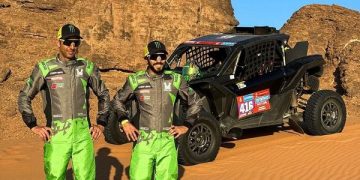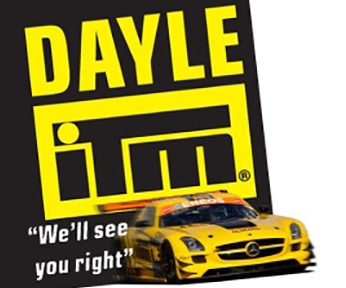If the unforgiving terrain, sprawling dunes, and testing nature of the Dakar Rally aren’t challenging enough, Brazilian competitors Rodrigo Varela and Enio Bozzano faced further complications before their 2024 race even began: Pirates.
South American Rally Raid champion Varela sent his Can-Am UTV to Europe by ship, intending to pick up the vehicle before journeying to Saudi Arabia for his Dakar debut.
Instead, he received news over the Christmas period that the carrier had been attacked by Houthi pirates near the Red Sea.
The ship was forced to divert from its course to avoid the attack but was sent around the African continent, adding an extra 20 days to the journey and meaning the vehicle would not make the start.
Varela and Bozzano were left in a race against time to source an alternate car, finding a replacement in Portugal. Getting the car race ready was the next challenge, something he could accomplish with the assistance of his two brothers and father, Reinaldo Varela, a Dakar champion and three-time world champion.
“We found a Can-Am in Portugal, owned by a driver who came to Brazil to compete in the Sertões with us,” Varela said. “But we had to make modifications and adaptations in a hurry. Fortunately, it worked and passed the Dakar inspection. That was the main thing: we’re going to race!”
“But we still don’t have all the parts we’ll need during the Dakar, which is a long race and requires a lot of maintenance. That’s why we’re counting on the help of the other teams. The Dakar is a mix of racing and adventure. And that makes solidarity one of its most notable features. People help each other when they can.”
Pirate attacks in the region are on the increase, with commercial carriers transporting food, oil and other materials targeted in a manner that continues to escalate.
New Zealand joined 43 other countries condemning the attacks, with Minister of Foreign Affairs Winston Peter sharing a statement on January 3 that stated, “Ongoing Houthi attacks in the Red Sea are illegal, unacceptable, and profoundly destabilizing.
“There is no lawful justification for intentionally targeting civilian shipping and naval vessels. Attacks on vessels, including commercial vessels, using unmanned aerial vehicles, small boats, and missiles, including the first use of anti-ship ballistic missiles against such vessels, are a direct threat to the freedom of navigation that serves as the bedrock of global trade in one of the world’s most critical waterways.”
Varela and Bozzano have begun their Dakar challenge and sit second overall in the SSV class following the completion of Stage 2.
Header Image: Reprodução/Instagram
















